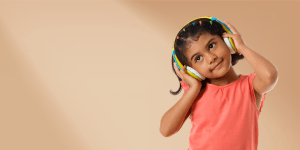 Did you know that listening, opens a new window is the foundational reading, writing and talking skill? Early literacy skills refer to the written and oral language skills kids begin to develop as babies and toddlers before they learn to read.
Did you know that listening, opens a new window is the foundational reading, writing and talking skill? Early literacy skills refer to the written and oral language skills kids begin to develop as babies and toddlers before they learn to read.
Early literacy skills include learning to talk, recognizing that words and sentences are made up of different sounds (phonological awareness), learning the ABCs—recognizing different letters, writing letters and learning letter sounds. These early literacy skills are crucial building blocks, opens a new window for learning to read and write and have been linked to academic success in school.
Reading, writing, singing, talking and playing, opens a new window with your child are the best ways to build these skills. You may be wondering how to get a toddler to write—when kids are little, they don’t need to write letters or words. Just holding a pencil or crayon helps develop the fine motor skills they will use when they learn to write their name, for example. Coloring and scribbling are excellent ways to strengthen these skills.
Talking and playing with your child are easy ways to build their vocabulary. When you’re playing together, narrate what you are doing and ask your child what they’re doing.
Singing to babies and toddlers is a great way to create phonological awareness—sing while driving or sing a song about what you’re doing as you move around the house. Kids don’t care what you sing about; they just like hearing your voice! Plus, singing is fun.
Finally, when it comes to reading, we know parents don’t always have as much time as they’d like to curl up with their kid and a pile of books. Making time to read a picture book together before bed is a great place to start.
For those times when you need a little help, we’ve put together a list of listening resources to help kids grow.
Listen to This
Babies (and toddlers) – Nursery rhymes, opens a new window are a great way to help babies identify different sounds in spoken language. The short, rhythmic rhymes are fun and can help kids recognize that different words have similar sounds.
Once they get a little older, you can introduce videos that show movements, opens a new window that go with the rhymes—now they’re developing fine motor skills and phonological awareness.
Toddlers (and preschoolers) – Fun and silly songs, opens a new window help create phonological awareness by clearly emphasizing how different sounds come together to make a word. Songs like the ABCs, opens a new window help kids learn the names of letters, while other songs emphasize different aspects of language, like syllables.
Many kids’ songs have dances or other movements accompanying them. Dance parties are an excellent way for toddlers to learn and get the wiggles out.
Toddlers (and preschoolers) – Once kids get a bit older, you can introduce phonics songs, opens a new window and videos, opens a new window. These resources directly teach letters and their associated sounds, helping develop the skills kids will need to decode (or sound out) unfamiliar words as they begin to read.
This is also an excellent age for video read-alouds. You’ll find many options at Kanopy Kids, opens a new window, hoopla Kids, opens a new window and BookFlix, opens a new window; just sign in with your Canton Public Library card. The Michigan e-Library (MeL) also provides parents with access to World Book Early Learning, opens a new window, which you should be able to access anywhere in Michigan (no library card required).
Preschoolers (and Kindergarteners) – If you’d prefer a more tactile listening experience, check out our collection of Wonderbooks, opens a new window. Wonderbooks are the book with CD, opens a new window’s savvy cousin—physical books with built-in audio that enables kids to read aloud to themselves (though reading is always better with a loved one). We have picture books, beginning (easy) readers, and nonfiction books. Just press the play button and turn the pages to follow along.
As always, if you have any questions or need help accessing digital materials, please don’t hesitate to ask a librarian for assistance.


Add a comment to: Parents: Listen Your Way to Early Literacy